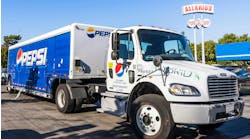Ricardo announced it will partner with Gas Technology Institute (GTI) on two major contracts to enable natural gas engines to provide an alternative to diesel power for medium- and heavy-duty commercial vehicles on the highways of California.Despite California’s substantial progress in reducing emissions from heavy-duty trucks and other mobile sources, diesel trucks remain major contributors to statewide emissions of oxides of nitrogen (NOx), greenhouse gases (GHG), and diesel particulate matter (PM). By 2031, the South Coast Basin will exceed mandatory air quality standards unless NOx emissions are reduced 90% compared with today.The Ricardo-GTI projects, co-funded by Southern California Gas Company (SoCalGas), are intended to develop natural gas technologies that will reduce NOx emissions from heavy-duty truck engines, helping California achieve attainment of NOx emission levels that surpass the California Air Resources Board’s goals, consume less fuel than current diesels, and provide truck operators with higher engine performance with the same reliability.On the first project, Ricardo mentioned it will support development and testing of advanced natural gas ignition systems, as part of GTI’s collaboration with the California Energy Commission. Ricardo’s role in this project will be to conduct testing of two different advanced ignition systems – High Frequency Discharge (HFD) and Pulsed Nano Plasma (C2) – so their effect on engine performance can be measured and evaluated. In addition to Ricardo and SoCalGas, GTI’s other partners on this project include Power Solutions International and EnerPulse Technologies, the company said.The second project, also co-funded by SoCalGas, will see Ricardo support GTI in the development of an ultra-low emission natural gas engine for on-road class 4-7 medium and heavy-duty trucks, sponsored by the South Coast Air Quality Management District. These classes of diesel vehicles are currently among the top ten sources of NOx emissions in California’s South Coast Air Basin, and are projected to remain one of the largest, even as the legacy fleet of older and higher polluting vehicles are replaced by vehicles meeting 2010 emissions standards.The development of ultra-low emission natural gas engines could significantly reduce emissions from this on-road source category and assist the region in meeting Federal ambient air quality standards in the coming years. Such ultra-low emission natural gas engines, capable of emitting 90 percent lower NOx emissions relative to current standards for heavy-duty vehicles, would approach the regional NOx emissions associated with operating an equivalent all-electric heavy-duty vehicle, when the emissions associated with the electricity production are taken into account. In addition to Ricardo, GTI’s other partners on this project include Power Solutions International.“Medium and heavy-duty trucks are an essential part of the transportation mix in California,” Ricardo president Clive Wotton said. “But they are also significant contributors to total NOx emissions. Trucks such as these are not as amenable to the type of electrification and hybridization approaches that have been applied very successfully in the passenger car and SUV sector. However, the substitution of diesel with natural gas as a transportation fuel for these classes of vehicle offers some attractive potential benefits in reducing NOx emissions. We at Ricardo look forward to working with GTI and its other partners on these two exciting projects, in which we aim to address some of the key technical and engineering development challenges to bringing natural gas forward as an attractive alternative to diesel fuel for the medium and heavy-duty trucks on California’s highways.”“SoCalGas is proud to be the only natural gas utility in America that helps fund breakthrough technologies crucial to meeting Southern California’s air quality and climate change goals,” said Rodger Schwecke, vice president of customer solutions for SoCalGas. “We are pleased to be a part of the research to develop new ultra-low emission natural gas engines for the medium and heavy-duty truck market. With this additional engine, we can advance our common goal to reduce emissions and improve air quality and leverage the benefits of low-cost natural gas for transportation applications.”
Voice your opinion!
Voice your opinion!
To join the conversation, and become an exclusive member of FleetOwner, create an account today!
Latest from Emissions & Efficiency
Latest from Emissions & Efficiency


